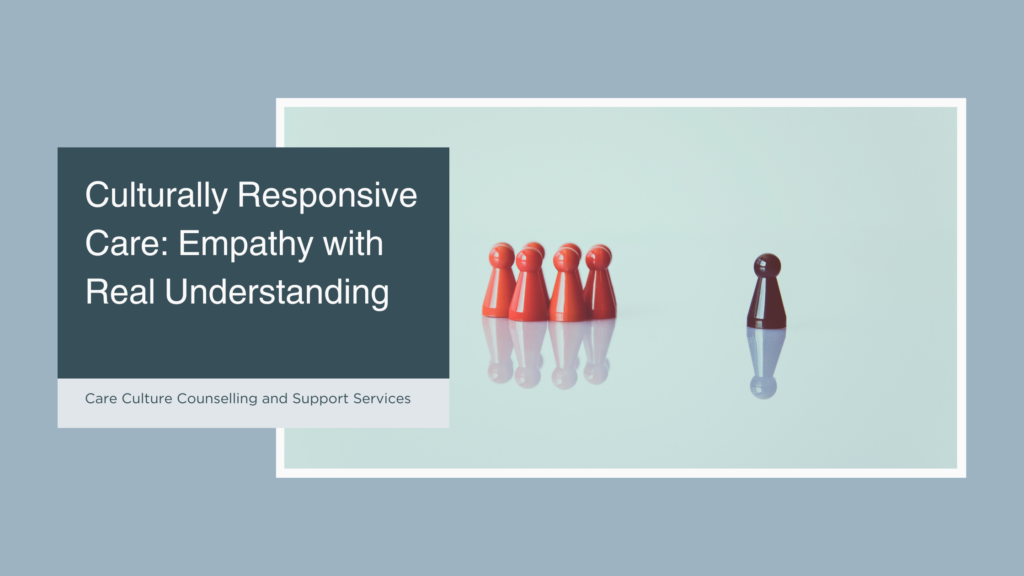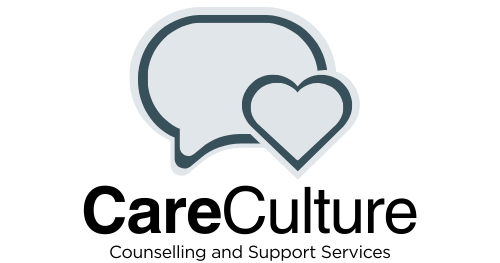
Being really understood can make a difference.
How often do you really feel understood? Some of us are lucky to have close connections to people who are supportive and really “get us”. But for many, those connections can be far and few between. How about in your schools, workplaces, and family? Are you truly understood for all the parts that you are? Being understood is a privilege for many, especially in a world can hold judgement and cause pain to “different”.
Through a culturally responsive counselling approach, it is the goal of the therapist to be informed, competent and responsive to the cultural needs, beliefs, and experiences you bring to the online counselling session. No more getting bogged down with the details of why this practice, that tradition, or this approach is important to you. It is valuing the things that are core to you and intentionally making efforts to learn and understand how culture plays a part in your world.
Culture is a core part of what makes us, us. Now before you leave, thinking this is just for melanated folks, remember that culture speaks to a whole heap load of ways in which we connect with others and hold community. Let’s dive into how culturally responsive counselling can make a world of a difference in your wellbeing.
Culture: More than just where you come from.
Culture refers to the shared beliefs, practices, norms, and values within a specific group of people who interact and live together. Culture is dynamic, evolving over time, and influenced by communication, history, and social contexts. Each context shapes our identities and interactions in unique ways. You can easily see this within your social circles, where there are often inside jokes and traditions that are adopted by your close ones. This often trickles into interactions with others and can become cultural practices within neighborhoods, schools, and communities.
When I run inclusion and equity workshops, I am often met with the statement “I don’t really have anything to contribute to this conversation because I’m ‘Canadian’ and I don’t really have a culture.” While we are talking about therapy and counseling here, I think that the topic of culturally responsive approaches go far beyond just therapist-client relationship and should be seen as a contributor to overall mental health and wellbeing. Culturally responsive care can be something that is practiced in schools, workplaces, communities, and anywhere where connections are built.

Culture has many forms.
Like I mentioned above, there is a common misconception that culture can only be related to our ethnic and racial backgrounds. While that is of course a very integral part of cultural identity, there are other aspects to culture that can influence how we view the world. It is important to note that race and ethnicity share an intersectional relationship, which often overlap in many ways. And while many understand race as a construct, we can still acknowledge the cultural richness that racial community can bring. Either way, let’s start with racial and ethnic culture and move towards an overview of other forms.
Ethnic Culture: Ethnicity speaks to the practices of folks typically within a specific global region and/or nationality. In some ethnic groups, this may be shared language, shared beliefs, and history.
Racial Culture: Race speaks to the concept of shared traits due skin colour. While many countries have residents that share skin tone, the ethnic culture within each region can differ. Racial culture is often something fostered in spaces where racial communities face similar experiences due to colonization and social injustice. While folks may differ in ethnic cultural practices, they may choose to create community with other folks with the same skin tone due to social experiences. This leads to the creation of racial culture with or without shared ethnic backgrounds.
Religious Culture: Some ethnic cultural practices include religious components, there are cultures created regardless of race, education, ethnicity, or profession and solely on religious beliefs. This can include language and phrases used to express emotions, traditions, holidays, and expectations of responsibilities.
Sexual Orientation and Gender Culture: All sexualities carry cultural practices and beliefs. While many may “other” the 2SLGBTQ+ community, the hetero community also carries cultural practices based on societal expectations and “norms”. Like all cultures, each community has sub-cultures that provide safety and meaning.
Workplace Culture: We see this one a lot and for good reason. Professions, workplaces, and sectors create a culture in the ways in which they communicate and engage. Teachers have a specific culture and expectation of each other, as do construction workers, paramedics, chefs, etc. When you spend a major part of your waking hours in a workplace, the culture within that space has an impact on the ways you view life and interact with others.
There are so many cultural groups that exist, from gaming, art, sports, music, hobbies, and interest. There can be a richness and community within cultural practices, but there can also be harmful and unhealthy expectations. I am by no means an expert in all cultural expressions, but I do know that recognizing and respecting cultural experiences play a huge role in our wellbeing and mental health.

Can a counsellor understand my culture if they aren’t from my culture?
It is impossible for a counsellor to know the background and cultural experiences of everyone that is looking for therapy. However, it is not impossible to prioritize safety and acknowledgement. There is a difference between meeting for online counselling with a therapist that questions or dismisses your traditions in a condescending way versus meeting with a counsellor that values you and aims to build their competence on their own time.
I often hear people share that the search for an online counsellor or online therapy can be anxiety inducing. Not only are you expected to search through 100s of therapy approaches, counselling profiles, or psychotherapy blogs, but you are also searching for signals of safety and understanding for someone like you. Culturally responsive counselling is committed to recognizing the nuances and allowing for the contextualizing of your identity to take up space in your counselling session. Even if we are from completely different cultures, a culturally responsive counsellor aims to mitigate harm that certain cultures may face through discrimination and othering.
What Is Cultural Competence in Therapy?
Cultural competence in therapy isn’t about memorizing a list of greetings in different languages. It’s about understanding that mental health isn’t a one-size-fits-all. Each person’s experience is woven from threads of culture, upbringing, and personal history. A culturally competent therapist doesn’t just nod and say, “Tell me more.” They dive deep into the rich tapestry of your life, considering:
- Lived Experiences: A culturally responsive therapist understands that the story you share about your grandmother’s favorite recipe, your childhood traditions, and songs are more than details. They shape your world view and emotional landscape.
- Social and Cultural Contexts: A culturally responsive counsellor doesn’t see life through just their lens. They understand that cultural norms, biases, and systemic inequalities affect mental health. They’ll discuss how your identity (whether it is related to your ethnicity, race, gender, sexuality, job, hobbies, neighborhood, etc) intersects with your well-being.
- Safety: A culturally responsive counsellor understands that safety looks different in every culture and that sometimes situations are way more nuanced than “setting boundaries” or walking away. There must be acknowledgement that one person’s experience within a cultural group can be completely different from someone else. Responsive acknowledges the intersectionality while recognizing the unique individual experiences of a person.
What if I don’t want to talk about my culture?
It would be unfair to say that we all have fond memories and positive feelings about the cultures in which we were raised (or even those we have chosen). For many, cultural norms and expectations can go completely against our identities and orientations. This in itself can lead to poor mental health, anxiety, depression, loneliness, and isolation.
Being responsive means that you approach each counselling session with humility and judgement-free curiosity. You intentionally attune with the person, show care, and acknowledge that cultural experiences can vary from person to person. We move at your pace and start where you are. If that means that you aren’t ready to speak about your culture, we won’t. If you are mourning the loss of cultural connection, we hold space for that and process those feelings. If you are angry, we explore and acknowledge the harm.
You can feel many things about your culture at once and it is the role of the counsellor to support you through that journey. Even if it means not discussing certain aspects of your culture if or until you are ready.
How to found the right culturally responsive counsellor for you
Finding a therapist that you vibe well with is really key to a strong and beneficial counselling relationship. Though there are many aspects to your cultural background and identity, you may feel that there are specific areas that you care strongly about. Some counsellors niche themselves into serving specific cultural and identity groups, others may provide generalized services. All of these approaches have their benefits, so it is truly up to you to decide if they feel like the right fit. Some things to explore in yourself when looking for culturally responsive counselling:
Language: Do you need someone who speaks your language? Whether it is Spanish, Dari, Arabic, Polish, Bengali, or Dutch, there are therapists that provide languages from across the globe. You may come across someone that provides online therapy and mental health supports that practices your preferred approach but doesn’t speak your language. You can always ask that person for a referral, as they may have a network of other counsellors that have similar psychotherapy and counselling approaches.
Ethnicity and Race : While much of the counselling sector has been dominated by the ethnic and racial majority of the country in which you are searching for help, there is a growing population of diversity in mental health help and services. Many online therapists offer virtual counselling from all across Ontario and disclose their ethnicity and race within their bios. You may also be seeking someone from a different ethnic background, due to the size and relationships within your community. A responsive counsellor will understand your needs and provide a referral if needed.
Profession: The cultural norms within your profession play a key role in your daily interactions. You may seek someone who has previously worked in your field, specializes in specific jobs, and or has a specialized approach that works best with your job experience. You can often search for keywords like: Counselling for educators, therapy for leaders, mental health support for artists, counselling for sex workers. Oftentimes therapists will provide a list of professions they have experience working with, but you can also ask in your initial contact.
In Conclusion: Find someone who really wants to understand you!
Online counselling and virtual therapy can be an accessible way to find mental health supports that are culturally responsive and authentic. Counselling can include CBT, DBT, ACT, narrative, and emotion focused approaches, those tools must also take into account the cultural needs of the client and relationship. This means knowing the difference between individualist and collectivist cultures, recognizing how history and ongoing world issues are impacting specific groups, and remaining humble when faced with areas in which you may not be informed and doing your best to become informed.
If you feel that I may be a good fit for you, let’s connect. I am also happy to provide a referral to a counsellor who may better fit your needs.
